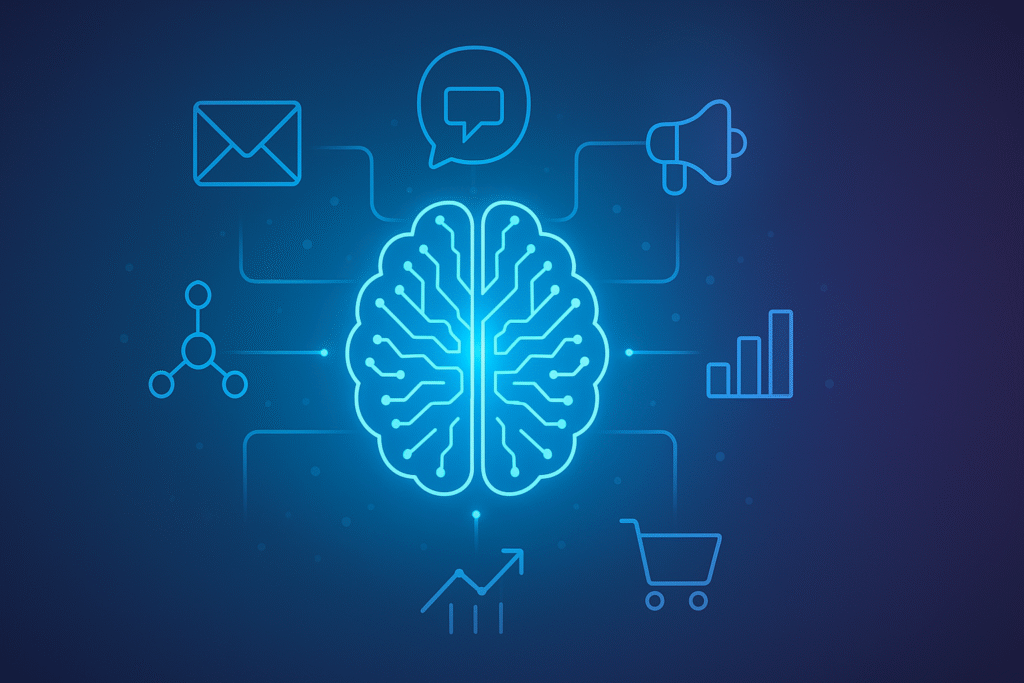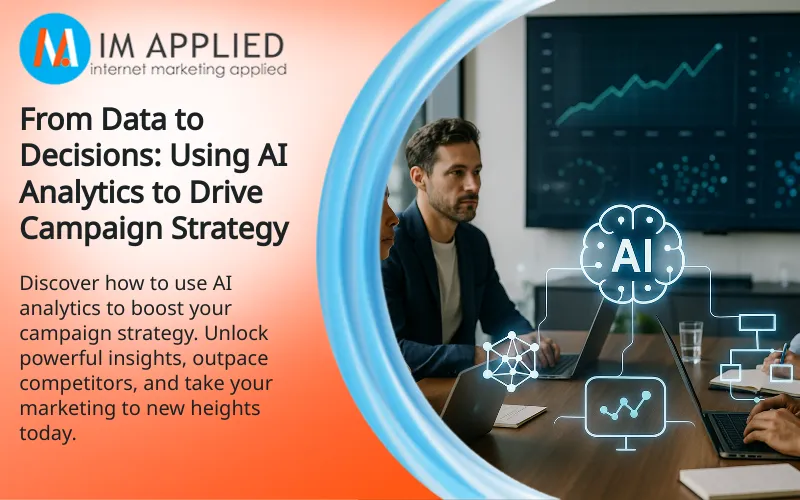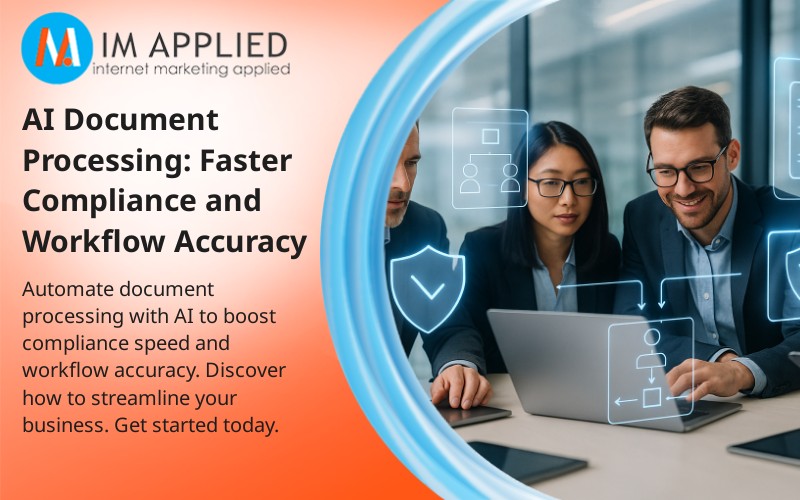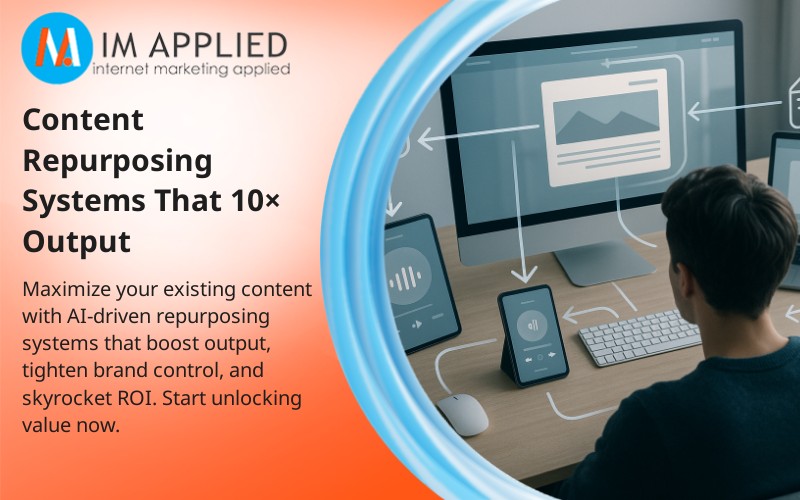From Data to Decisions: Using AI Analytics to Drive Campaign Strategy
Karl Marais | 23 July 2025
AI is everywhere, on your phone, in your car, and for some even in your fridge.
Yet, many marketers still rely on spreadsheets, convinced that AI is too complicated, too expensive, or simply too intimidating.
But overlooking AI in your marketing is like ignoring the internet in 1995.
AI-powered analytics aren’t a futuristic gimmick; rather, they’re the key to unleashing explosive growth and outpacing your competition.
Here’s how you can make AI work for your marketing.
The Role of AI in Modern Marketing
AI is transforming how businesses understand and interact with consumers.
By automating routine tasks, AI marketing tools free up marketers to focus on strategy and creativity.
Integrating artificial intelligence streamlines workflows and enables marketing automation, making campaigns more efficient and targeted.
A standout use is personalized experiences enabled by AI-powered marketing.
By analyzing vast data sets, AI delivers tailored content that improves engagement and conversion rates.
This directly contributes to more effective AI-driven marketing strategies and impactful results with less effort.
AI-driven digital marketing adapts in real time to insights gleaned from ongoing data analysis.
Businesses that leverage AI gain powerful analytics to optimize campaigns, allocate resources efficiently, and maximize ROI.
The shift toward AI-driven marketing is visible everywhere; it’s more crucial now than ever for staying ahead.
How AI is Changing Marketing Landscapes
The impact of AI is reshaping the marketing landscape. AI-driven marketing trends are forcing brands to innovate, moving beyond traditional methods.
By processing and analyzing massive amounts of data at unmatched speed, AI enables marketers to predict consumer behavior and develop proactive, relevant campaigns.
The future of marketing is data-guided. AI uncovers patterns hidden in data, turning analysis into actionable strategies.
This allows companies to navigate the complexities of modern marketing with greater efficiency and strategic clarity.
AI’s influence will define the next era of marketing, raising brand performance to new heights.
Understanding AI Analytics and Its Importance
AI analytics lead the way in marketing data analysis.
Leveraging AI, businesses glean deep insights into consumer interactions and preferences, making campaigns more precise and decisions more data-driven.
AI-powered insights help marketers spot trends and forecast future opportunities, enabling continuous optimization.
Predictive analytics refines strategies to better align with customer expectations, offering a significant competitive advantage.
Moreover, AI analytics boost both user experience and business outcomes.
Companies embracing this approach position themselves for sustainable growth and lasting success.
Predictive Analytics: Anticipating Customer Behavior
Predictive analytics eliminates guesswork by forecasting future customer actions.
Using advanced data techniques, businesses can anticipate needs before they arise and craft responsive marketing strategies.
Analyzing past behaviors, AI models identify which customers are most likely to respond to specific campaigns, resulting in improved targeting and higher conversion rates.
For example, online retailers can accurately identify repeat buyers and tailor communications accordingly.
This proactive approach yields seamless, personalized experiences and optimizes resource allocation.
For deeper insights into retention strategies, explore how AI anticipates customer behavior.
Ultimately, predictive analytics empowers smarter decisions and more effective campaigns.
Implementing AI in Your Marketing Stack

AI marketing is now essential, not optional.
Using AI tools and platforms boosts efficiency and precision throughout the marketing process, from planning to execution.
Integrating AI helps companies make faster, more accurate decisions and deliver personalized customer experiences.
As marketing becomes increasingly automated and intelligent, understanding and leveraging AI’s capabilities is crucial for success.
Choosing the Right AI Tools
The right AI marketing tools can significantly enhance the effectiveness of AI adoption. Start by assessing your company’s unique needs and goals.
When selecting AI marketing solutions, focus on user-friendliness, scalability, cost-effectiveness, and seamless integration with existing systems.
A thorough evaluation ensures your AI tools elevate marketing effectiveness and drive growth.
Integrating AI into Existing Systems
Successful AI adoption relies on smooth integration with current systems. Begin by reviewing your existing infrastructure for areas that would benefit from AI.
Strategic planning, including addressing data integration and operational disruptions, is key.
APIs enhance connectivity, facilitating real-time data flow and informed decision-making.
Proper integration lets businesses harness AI’s power for improved campaign performance and customer satisfaction.
Overcoming Implementation Challenges
AI implementation often presents hurdles, including data quality, technical expertise, and team adaptability.
Invest in training and skill development to bridge knowledge gaps and enhance your and your team’s capabilities.
Encourage openness to change through strong leadership and clear communication.
Establish troubleshooting frameworks to resolve issues promptly, ensuring a seamless transition to AI-powered marketing.
Ensuring Data Security and Privacy
AI adoption brings responsibility for data security and privacy. Prioritize robust protection, especially with regulations like GDPR in place.
Ethical marketing practices, safeguarding customer information, and transparency in data use not only ensure compliance but also build essential customer trust.
Adopting responsible AI policies helps establish your business’s reputation for integrity.
Measuring and Maximizing AI’s Impact

Measuring AI effectiveness is crucial.
AI marketing metrics, such as engagement rates, conversions, and user behavior, provide deep insights into campaign performance.
AI-based analysis quickly highlights emerging trends, allowing marketers to fine-tune campaigns for maximum impact and efficient resource allocation.
Evaluating AI campaigns involves understanding which elements yield the most significant results.
Ongoing analysis and adaptation keep marketing strategies agile, ready to seize new opportunities.
Future Trends in AI-Driven Marketing
The future of AI marketing is rich with possibilities.
New technologies are revolutionizing marketing strategies, and machine learning and automation are leading to more personalized and effective campaigns.
Trends like predictive analytics allow a deeper understanding of customer preferences.
Next-generation tools automate repetitive tasks, allowing marketers to devote their energy to strategy and creativity.
Emerging technologies such as chatbots, voice search, and personalized content recommendations are transforming customer interactions, reaching the right people with the right message at the right time.
By embracing these innovations, businesses can predict market shifts and tailor strategies for success.
Emerging AI Technologies and Their Applications
Advancements in machine learning and deep learning are unlocking new frontiers.
AI algorithms learn from customer behavior, allowing the optimization of marketing messages and timing.
Tools like chatbots and analytics platforms empower marketers with real-time insights, increasing campaign effectiveness and ROI.
Deep learning identifies granular consumer preferences for highly personalized campaigns.
By automating data-heavy tasks, businesses free up resources for creative initiatives.
For more on adopting new technologies, explore our beginner’s guide to AI automation.
Building a Data-Driven Culture
A data-driven culture is essential to harnessing AI’s power.
Encourage data literacy so every team member understands how insights shape better campaigns.
Establish clear processes for collecting, analyzing, and taking action on data.
This mindset shift—from guesswork to data-informed marketing- leads to smarter decisions and measurable growth.
With robust data literacy, your team can respond more quickly to customer needs and market changes, propelling your business forward.
Ethical Considerations in AI Marketing
Ethics are crucial as AI becomes integral to marketing.
Responsible AI ensures fairness, transparency, and equity, thereby avoiding biased algorithms and maintaining customer trust.
Be open about how you use data, and continuously review your systems for fairness and accuracy.
Responsible AI practices protect both your customers and your brand’s reputation. For more on ethical AI, check our article on AI ethics in marketing.
Conclusion
The marketing world is evolving rapidly, and AI is at the heart of this transformation.
Companies leveraging AI enjoy significant benefits, from hyper-personalized campaigns to faster, more informed decisions.
Effective AI marketing means greater engagement, higher conversion rates, and streamlined operations.
Looking ahead, combining AI’s power with human creativity will define tomorrow’s marketing leaders.
Don’t get left behind.
To learn more about how AI is transforming marketing and SEO, explore our guide on ‘The Impact of Artificial Intelligence on SEO Strategies’ for insights to future-proof your strategy.




